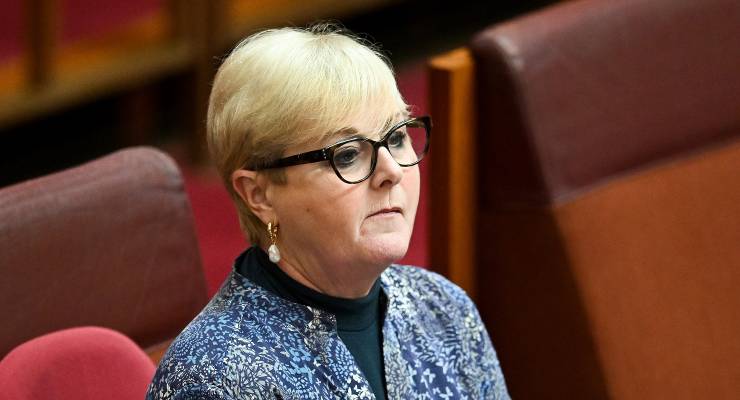
This week, the ACT government settled with outgoing Liberal senator for WA Linda Reynolds for $90,000 over remarks made in a letter by former director of public prosecutions Shane Drumgold to the Australian Federal Police during former staffer Bruce Lehrmann’s criminal trial for the alleged rape (denied by Lehrmann) of former colleague Brittany Higgins. The government also issued an apology for the contents of the letter.
In a statement, Senator Reynolds said she was “pleased” to have settled the defamation claim against the ACT, and that since the trial she’d been working to vindicate her reputation. Reynolds referred to the fact that this is the “fifth defamation claim I have resolved to my satisfaction”. She will meet Higgins and her partner David Sharaz in mediation today over another defamation proceeding.
But while Reynolds might win the prize for the biggest number of claims, who are the other politicians to take their quarrels to the courts over the past decade?
Joe Hockey v Fairfax (2015)
The former treasurer sued the then Fairfax papers in 2015 over an infamous headline describing him as a “treasurer for sale”, amid reporting that detailed his relationship to the North Sydney Forum and its connections to the Liberal Party. Then editor in chief of The Sydney Morning Herald, Darren Goodsir, was revealed in court to have used some colourful language in relation to Hockey’s response to the articles, but the papers eventually lost, with Hockey’s partial victory paid out to the tune of $200,000.
Sophie Mirabella v The Benalla Ensign (2018)
Former Liberal MP for Indi, Sophie Mirabella, successfully sued the Benalla Ensign, an independent publication owned by the McPherson Media Group (which owns a number of small publications across the Goulburn Valley and Riverina regions). The legal action was brought over an April 2016 article that claimed Mirabella physically pushed political rival Cathy McGowan at a nursing home. Mirabella was awarded $175,000 in damages.
Luke Foley v ABC (2018)
Former NSW Labor leader Luke Foley threatened to sue the national broadcaster in 2018 over allegations he sexually harassed then ABC political reporter Ashleigh Raper at a Christmas function in 2016.
Following the allegations, Foley announced he was resigning from the state leadership, as well as commencing defamation proceedings in the Federal Court. Less than three weeks later, he backed down from the threats, and quit the Parliament at the following election.
Emma Husar v BuzzFeed News (2018)
In 2018, then BuzzFeed News journalist Alice Workman published a story about former Lindsay MP Emma Husar which Husar claimed portrayed her as a “slut” and “sexually perverted”. The Labor politician said the article claimed she had exposed herself to a colleague in a manner that referenced the famous Sharon Stone scene in the 1992 film Basic Instinct. She also said the articles claimed she was a “bully” who “[misused] work expenses”.
Husar vehemently denied the allegations, telling Parliament in December 2018: “I am not a bully, I am not Sharon Stone, I am not a thief and I did not deliberately misuse my work expenses.”
The parties reached an out-of-court settlement in 2019, with BuzzFeed and Workman apologising to Husar, acknowledging that they erred in not contacting her before publication.
Sarah Hanson-Young v David Leyonhjelm (2019)
Greens Senator Sarah Hanson-Young sued former Liberal Democrats senator David Leyonhjelm in 2019 over remarks to the media that she claimed portrayed her as a “hypocrite” and “misandrist” after they had a confrontation in the Senate in 2018.
Leyonhjelm had interjected in a Senate debate about women’s safety, saying that Hanson-Young should “stop shagging men”.
Leyonhjelm lost an appeal bid in 2021 and was ordered to pay $120,000 in damages.
Mark McGowan v Clive Palmer (2020)
Former WA premier Mark McGowan and mining magnate Clive Palmer were found to have defamed each other over a 2020 war of words during the COVID-19 pandemic.
Palmer told the Federal Court that McGowan’s description of him as an “enemy of the state” had brought him into “hatred, ridicule and contempt”. McGowan’s counter-claim said Palmer had defamed him by claiming he had lied to the people of Western Australia over border closures.
Palmer received $5,000 in costs, while McGowan received $20,000.
Christian Porter v ABC (2021)
Former attorney-general Christian Porter sued the national broadcaster after an online story by reporter Louise Milligan that his lawyers claimed identified him as having been accused of raping a teenage girl in 1988 and that it contributed to “her taking her own life” — allegations which he has always denied.
Porter claimed that while he was not named in the story, he was easily identifiable.
The ABC and Porter settled out of court in 2021, but without a retraction of the article. The ABC said it “stands by the importance of the article, which reported on matters of significant public interest”.
John Barilaro v Friendlyjordies (2021)
In 2021, former deputy premier of New South Wales, John Barilaro, sued YouTuber Jordan Shanks-Markovina (known on the internet as friendlyjordies), claiming that a series of videos published by Shanks-Markovina defamed him as a “corrupt conman” over a series of allegations that claimed Barilaro corruptly engaged with councils and in water dealings. Barilaro settled in November 2021, with Shanks apologising for the videos.
Jonathon Duniam v Sarah Hanson-Young (2021)
Tasmanian Senator Jonathon Duniam was forced to apologise to Greens Senator Sarah Hanson-Young after making an appearance on Sky News with Rita Panahi and claiming that a child at a logging protest in Victoria was related to the South Australian Senator.
“What concerns me more is this happens to be the niece of an Australian senator, I understand,” he said.
“So, I say to Sarah Hanson-Young and all other Green senators: ‘Clean up your act, and make sure you do what the rest of us think is the right thing to do as parents, don’t put your kid in harm’s way.’”
Sky News Australia paid out $40,000 in addition to legal costs to avoid a defamation claim being pursued by Hanson-Young. It also agreed to publish an apology on its Facebook page and on its website, as well as an on-air apology for the segment, which did not contact Hanson-Young before airing.
Peter Dutton v Shane Bazzi (2021)
In 2021, now Opposition Leader Peter Dutton unsuccessfully sued refugee advocate Shane Bazzi over a six-word tweet that called Dutton a “rape apologist”.
The tweet linked to a 2019 Guardian Australia article reporting remarks by Dutton that some female refugees were “trying it on” by making claims they had been raped, and subsequently needed to travel to Australia from offshore detention for medical treatment.
Bazzi claimed a defence of honest opinion, as well as fair comment, and lost at trial, but won on appeal, with Dutton failing to obtain special leave to appeal to the High Court.
Pauline Hanson v Brian Burston (2023)
One Nation leader Pauline Hanson last year won a $250,000 defamation battle against a one-time senator, Brian Burston, following claims she made that Burston had sexually abused a colleague.
While the imputations were found to be conveyed by the full bench of the Federal Court, Hanson succeeded in arguing a defence of substantial truth.
Burston was ordered to pay costs for the suit and appeal.
Linda Reynolds v ACT government (2024)
Outgoing Liberal Senator for WA Linda Reynolds launched a defamation action against the ACT government and former director of public prosecutions Shane Drumgold over remarks made in a letter by Drumgold to the Australian Federal Police during former staffer Bruce Lehrmann’s criminal trial for the alleged rape of former colleague Brittany Higgins. Lehrmann has always maintained his innocence.
The letter accused Reynolds of “disturbing conduct” that included political interference in the trial, and was later released via a freedom of information request.
This week, the ACT government settled with Reynolds for $90,000, and issued an apology for the contents of the letter.








Politicians don’t deserve the right to sue for defamation, since they have the right to defame anyone else via parliamentary privilege.
Funny how most defamation cases involve politicians. Are their egos really that precious? If they can’t stand heat they should leave the kitchen.
Defamation law urgently needs an overhaul (long promised), but what chance is there of that while politicians can still finance their fifth investment property from defamation actions?
I can understand the ACT government settling on a commercial basis to avoid substantially greater costs of taking Linda Reynolds’ claim to trial, but it is a scary idea that a person in the position of the Director of Public Prosecutions might be deterred from reporting concerns to Police by the prospect of subsequent defamation action. Surely there are good public policy reasons for good faith reports to Police being absolutely privileged?
The interesting thing about defamation cases is that, despite Reynold’s claims to the contrary, they never vindicate anyone’s reputation. The damage is already done and taking up legal proceedings only ever adds another layer to that damaged reputation. And that’s what the money is for – it’s financial compensation for a trashed reputation – not a vindication of anything.
Forty odd years ago Alan Bond found out, the hard way, the cost of “doing business in Qld” when he capitulated his 9’s case vs Bjelke-Petersen in what was a lay-down misere to defend.